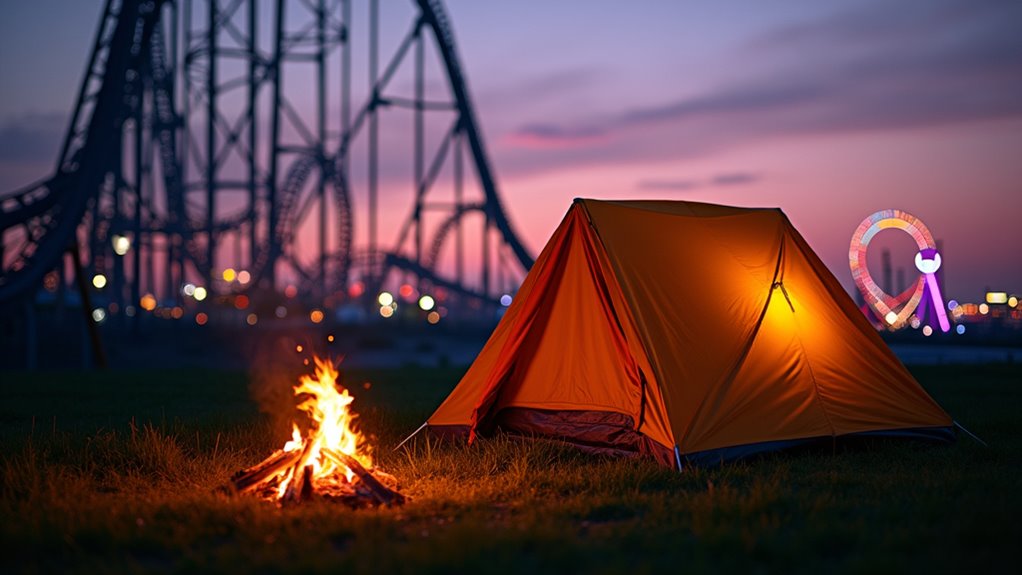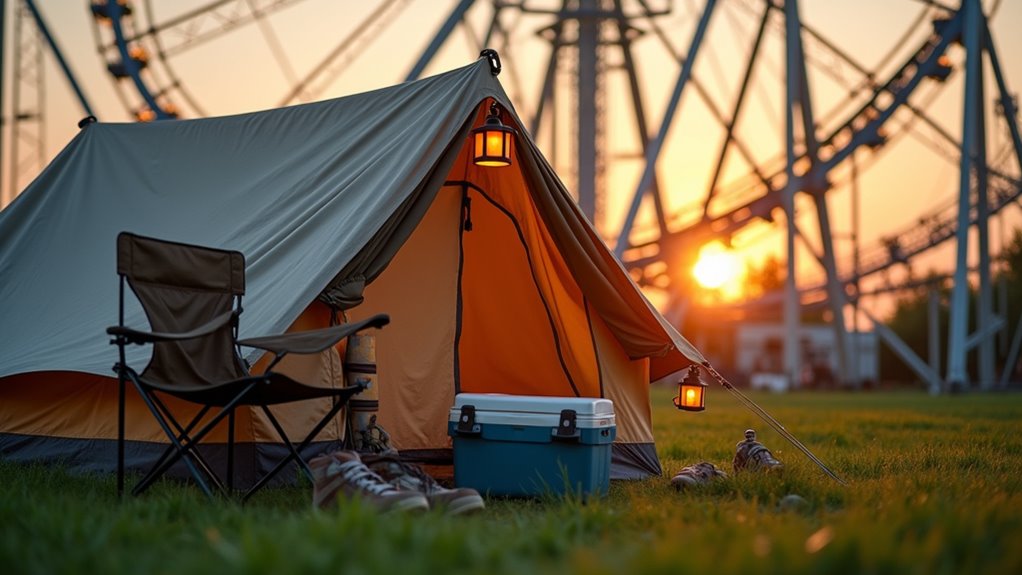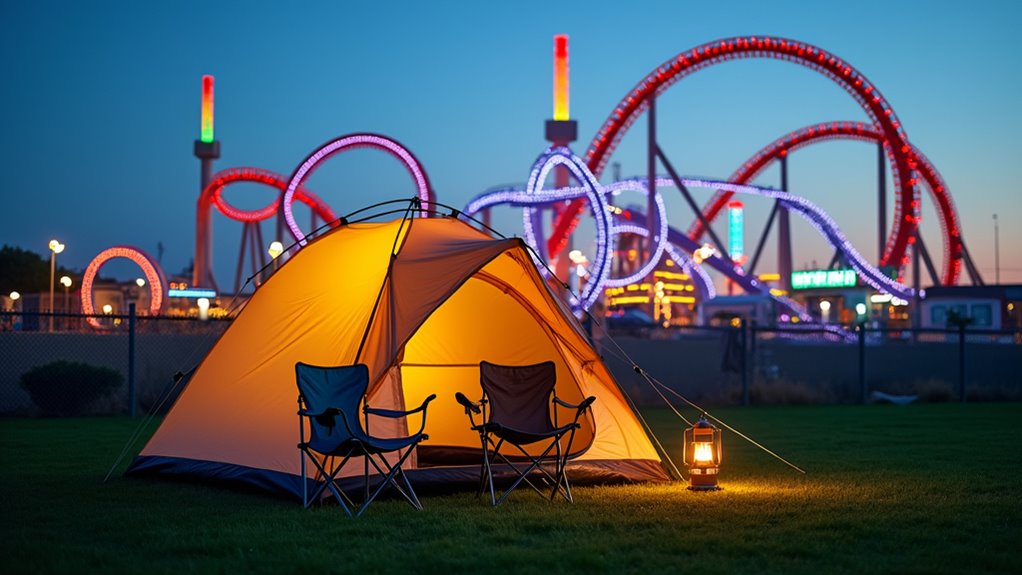Physical Address
304 North Cardinal St.
Dorchester Center, MA 02124
Physical Address
304 North Cardinal St.
Dorchester Center, MA 02124

Get ready to discover how camping near amusement parks creates the ultimate family adventure that saves money while doubling your fun.
You probably don’t realize that many major amusement parks allow overnight camping within walking distance of their gates, creating an entirely different vacation experience than traditional hotel stays. When you combine the thrill of roller coasters with campfire evenings, you’re looking at significant savings on accommodation while gaining flexibility most families never consider. This hybrid approach transforms how you’ll experience both the great outdoors and theme park magic, but there’s a strategic way to make it work seamlessly.

When you combine camping with theme park visits, you’ll slash your accommodation costs while maximizing your vacation time. Hotel rooms near popular parks often cost $200+ per night, while campground fees typically run $30-50.
You’re also just minutes from park entrances, meaning you can return to your campsite for afternoon naps or meal breaks without losing precious park time.
The proximity to park entrances lets you easily pop back for quick breaks without sacrificing your adventure time.
You’ll have complete control over your food budget by cooking meals at your campsite instead of paying inflated theme park prices. Your family can enjoy s’mores around the campfire after exhausting days on roller coasters, creating memories that extend beyond the park gates.
Plus, you’ll wake up refreshed in nature rather than cramped hotel rooms. For those seeking even more adventure, consider bringing your cycling gear to explore scenic routes around the theme park area during your stay.
Since location determines your entire camping experience, you’ll want to choose campgrounds that offer both convenience and value near your target theme park.
Disney’s Fort Wilderness Resort provides shuttle service directly to Magic Kingdom, though you’ll pay premium prices.
For budget-friendly alternatives, consider Chip and Dale’s Campground or Tropical Palms Resort nearby.
Universal Studios visitors should check out KOA Orlando, offering shuttle services and reasonable rates.
Cedar Point fans can save considerably at Lighthouse Point, the park’s own campground with early entry perks.
Six Flags Great Adventure pairs well with Timberland Lake Campground, just minutes away.
Always compare amenities like WiFi, pools, and laundry facilities.
Book early during peak seasons, and don’t forget to factor in shuttle costs when calculating your total budget.
Many campgrounds offer camping showers with varying levels of privacy and water pressure, so research these facilities beforehand to ensure they meet your comfort standards.

Packing for a camping and amusement park combination trip requires strategic planning that’ll save you money and hassle. You’ll want to bring a comfortable day pack for carrying water bottles, snacks, and sunscreen throughout the park.
Smart packing for dual camping-amusement park adventures means bringing essentials that work double duty while keeping costs down.
Pack lightweight, moisture-wicking clothes that’ll work for both hiking trails and standing in long lines. Don’t forget portable phone chargers since you’ll be using GPS and taking photos all day.
Bring your own refillable water bottles to avoid expensive park prices. Pack blister pads and comfortable walking shoes – you’ll cover serious ground.
Include a small first-aid kit with pain relievers for those inevitable headaches. Store valuables in your campsite’s locked vehicle rather than carrying them around.
Smart packing means more money for rides and fewer trips back to camp. When researching your stay, apply the same careful consideration to selecting ideal campgrounds that offer convenient access to the amusement park while providing the amenities you need.
Although theme park tickets can drain your wallet faster than a roller coaster drops, combining camping with your amusement park adventure creates considerable savings opportunities you shouldn’t overlook.
You’ll slash accommodation costs by 60-80% compared to nearby hotels. Pack meals and snacks to avoid overpriced park food – bringing sandwiches, trail mix, and water bottles saves hundreds for families. Buy multi-day tickets online in advance for better rates than gate prices.
Visit during off-peak seasons when both camping fees and park admission drop significantly. Split camping costs with friends or family by sharing large sites. Look for parks offering camping/admission package deals.
Use apps to find gas stations with lowest prices near your campground. Bring refillable water bottles and utilize free campground amenities like pools, playgrounds, and Wi-Fi instead of paying for entertainment elsewhere.
Consider renting an RV for larger groups, as it eliminates the need for multiple hotel rooms while providing kitchen facilities to prepare meals and reduce dining expenses.

Smart budgeting sets the foundation, but maximizing your time requires strategic scheduling that balances campground routines with park adventures. You’ll want to establish morning and evening routines at your campsite while dedicating prime hours to the theme park.
Start each day early at camp with quick breakfast prep and gear organization. Most parks open before 10 AM, giving you access to shorter lines and cooler temperatures.
Plan your return to camp during peak afternoon hours when crowds surge and heat intensifies.
Consider these scheduling essentials:
This rhythm keeps costs down while maximizing enjoyment. If you’re traveling with young children, remember that toddler camping requires additional planning considerations for nap times and meal schedules that should factor into your park visit timing.
When camping near bustling entertainment venues, you’ll face unique safety challenges that differ from traditional wilderness camping. You’re dealing with increased foot traffic, potential noise levels, and crowds that can affect your campsite’s security.
Keep your campsite well-lit and lock valuables in your vehicle rather than leaving them in tents. Choose campsites away from main pedestrian routes to reduce unwanted visitors. Establish clear meeting points and communication plans with family members, especially when splitting time between the campground and amusement park.
Monitor noise ordinances since entertainment venues often extend operating hours. Pack earplugs for better sleep quality. Stay aware of emergency procedures for both the campground and nearby attractions. Keep emergency contacts readily available and ensure all family members know campsite locations and numbers for quick identification. Remember that festival camping requires similar vigilance when it comes to securing your belongings and maintaining situational awareness in crowded environments.
You’ve probably heard that camping near theme parks means sacrificing comfort for savings, but that’s not entirely true. While you’ll definitely save money on hotels, you’re actually gaining flexibility and creating richer memories. Your kids will love the adventure of sleeping under stars after conquering roller coasters. Sure, you’ll need extra planning and gear, but the payoff is worth it. This combo trip proves you can have thrilling entertainment and authentic outdoor experiences without breaking the bank.